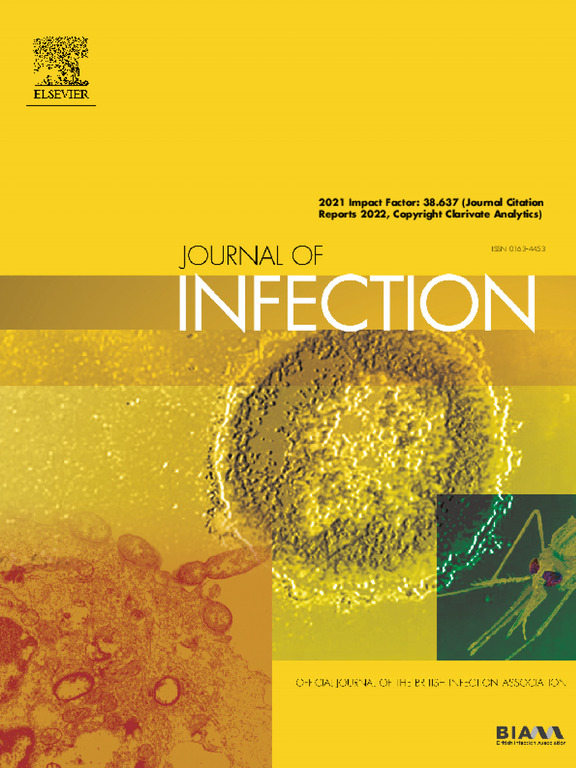Ongoing suppression prevents relapse in streptococcal periprosthetic joint infection: A prospective long-term cohort study
IF 14.3
1区 医学
Q1 INFECTIOUS DISEASES
引用次数: 0
Abstract
Objectives
Antimicrobial suppression improves short-term outcome of streptococcal periprosthetic joint infection (PJI) compared to standard treatment. This study assesses the long-term effectiveness of suppression.
Methods
This prospective study included consecutive patients with streptococcal PJI. Infection-free survival was analyzed using the Kaplan-Meier method and compared between patients receiving standard therapy (12 weeks) and those with suppression therapy (>6 months) with the log-rank test.
Results
A total of 63 PJI episodes were analyzed. Standard treatment was administered to 33 patients, while 30 patients received suppression therapy (10 had ongoing and 20 had discontinued suppression at time of follow-up). Predominant pathogens included Streptococcus agalactiae (n=20) and Streptococcus dysgalactiae (n=18). The main surgical procedures used were two-stage exchange (n=35) and prosthesis retention (n=21). At 7.5 years, infection-free survival was significantly higher in the suppression group (62%) compared to the standard therapy group (38%) (p=0.038). Streptococci accounted for 14 of 27 failures (52%). Suppression effectively prevented streptococcal infection during treatment; however, relapses or new streptococcal infections occurred in 5 of 20 patients (25%) after discontinuation. Failures during ongoing suppression were exclusively caused by gram-negative rods.
Conclusions
Suppression therapy significantly improves long-term outcome in streptococcal PJI. While suppression effectively prevents streptococcal reinfections during treatment, the risk of recurrence reemerges after discontinuation.
持续抑制可预防假体周围链球菌感染复发:一项前瞻性长期队列研究。
目的:与标准治疗相比,抗菌药物抑制可改善链球菌假体周围关节感染(PJI)的短期预后。本研究评估了抑制的长期有效性。方法:这项前瞻性研究纳入了连续的链球菌性PJI患者。采用Kaplan-Meier法分析无感染生存期,并采用log-rank检验比较接受标准治疗(12周)和抑制治疗(6个月)患者的无感染生存期。结果:共分析了63例PJI发作。33例患者接受标准治疗,30例患者接受抑制治疗(10例持续治疗,20例在随访时停止抑制治疗)。主要病原体为无乳链球菌(n=20)和无乳链球菌(n=18)。采用的主要手术是两期置换(n=35)和假体保留(n=21)。在7.5年时,抑制组的无感染生存率(62%)明显高于标准治疗组(38%)(p=0.038)。27例失败中有14例为链球菌(52%)。治疗期间抑制有效预防链球菌感染;然而,停药后20例患者中有5例(25%)出现复发或新的链球菌感染。持续抑制期间的失败完全是由革兰氏阴性棒引起的。结论:抑制治疗可显著改善链球菌PJI的长期预后。虽然抑制有效地预防了治疗期间链球菌的再感染,但停药后复发的风险再次出现。
本文章由计算机程序翻译,如有差异,请以英文原文为准。
求助全文
约1分钟内获得全文
求助全文
来源期刊

Journal of Infection
医学-传染病学
CiteScore
45.90
自引率
3.20%
发文量
475
审稿时长
16 days
期刊介绍:
The Journal of Infection publishes original papers on all aspects of infection - clinical, microbiological and epidemiological. The Journal seeks to bring together knowledge from all specialties involved in infection research and clinical practice, and present the best work in the ever-changing field of infection.
Each issue brings you Editorials that describe current or controversial topics of interest, high quality Reviews to keep you in touch with the latest developments in specific fields of interest, an Epidemiology section reporting studies in the hospital and the general community, and a lively correspondence section.
 求助内容:
求助内容: 应助结果提醒方式:
应助结果提醒方式:


